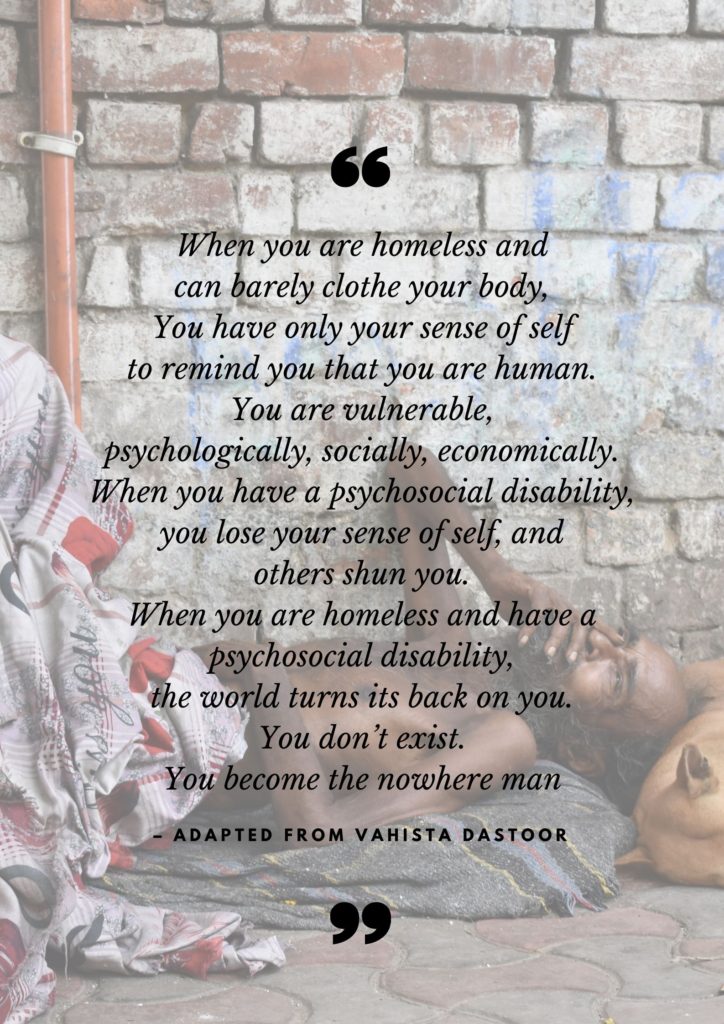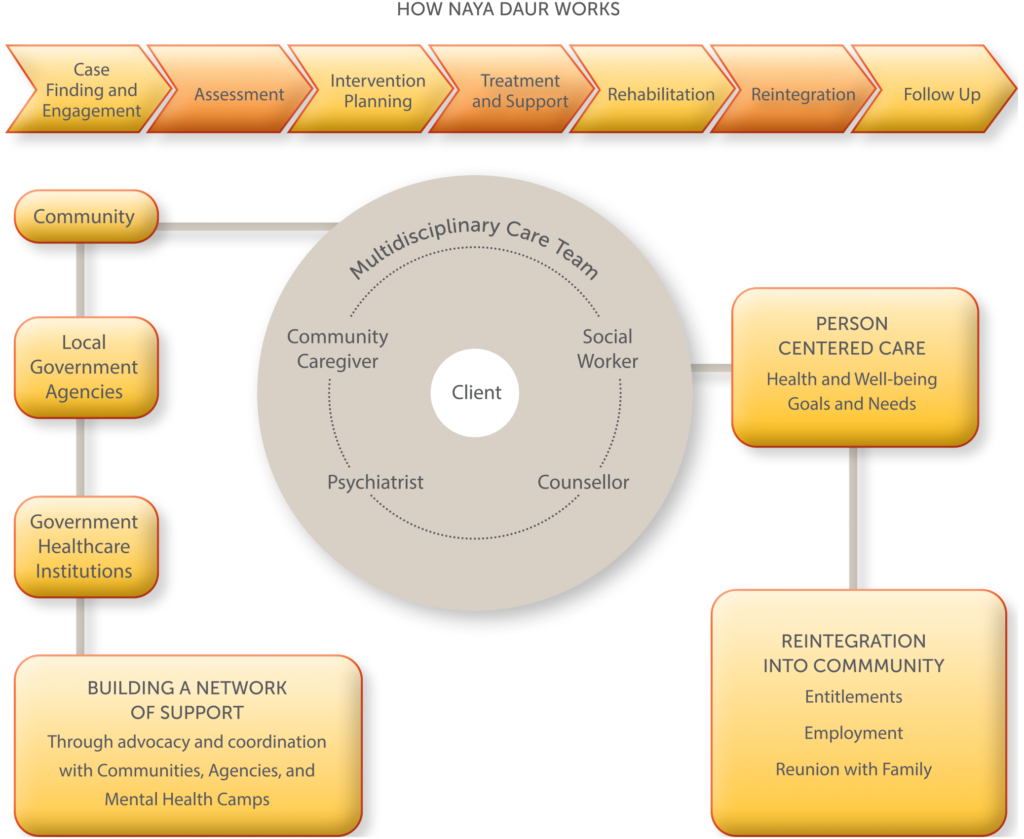Call Us: 91 9903942044 / +91 8820713621 Email Us: info@isankalpa.org
Naya Daur is the flagship programme of Iswar Sankalpa since 2007. It provides mental healthcare and allied services to homeless persons with psychosocial disabilities on the streets itself, through a multidisciplinary team. The team involves a network of voluntary caregivers from the community to support the clients in their journey towards reclaiming their rightful place as citizens of the country.
This covers over 75+ wards in North, South and Central Kolkata.

Lost within and without, the nowhere persons are persons with psychosocial disabilities who find themselves out on the street all by her/himself, with no place to call home anymore.
The nowhere person can be found loitering aimlessly on the streets, deep in conversation with themselves or an imaginary someone, sometimes snatching and stealing food from a shop, sometimes scavenging through a garbage dump. Perhaps s/he is wearing the tattered remnants of some clothing article, or a self-made frock, or perhaps even nothing at all, or maybe tattered layers of multiple mismatching clothes on a hot summer day. They may be sitting remotely – not approached by anyone, in fact avoided by most – on a street side; lost in their own world of hallucinations and delusions, they may even rant and rave. Perhaps s/he is guarding her/his bundle of possessions – those small bits of plastic, torn clothes, bottles, etc – through which they now relate themselves to the world; sometimes they can even be found mute and impassable on a busy street corner, no word, no movement. And all this while, through all these moments, they fight, they struggle: with conflicts within and without.
Living in situations such as these allows for them to fall prey to abuse of every kind, at any given moment - Road accidents, physical health issues, sexual abuse, unwanted pregnancies, malnutrition to name a few. They are seen as a threat by others, a menace to our environment, and a risk to others safety. But what about their safety, their living, their rights and dignities?
In India, the entire public healthcare and related support systems depend on the institution of the family- in cases of medical treatment their family name and address is compulsorily required to even admit a person. This would not be much of an impediment for the average family-bound person, however, for a homeless person with psychosocial disability, this criteria is tantamount to scaling Mount Everest. For this person, with no recollection of name or address, getting admission into a hospital or even availing basic healthcare thus becomes near impossible. In such cases how can a homeless person with psychosocial disability be expected to avail the most basic of rights, that is, healthcare?
This is where Iswar Sankalpa comes in, by working with these nowhere persons in the very place on the streets where this population has made their home.
Alongside the Naya Daur programme, Iswar Sankalpa runs two Day Care Centres.. One of the centres is in the premises of the Hastings Police Station, while the other is in the midst of a community in Keoratala.

Lives Touched
Persons Engaged in Livelihood
Awareness Events Organized
Persons Reached Through Events and Camps
Community Caregivers Supporting Voluntarily
Persons Received Entitlement Support
A young man went in search of a job outside his home state, Maharashtra. On the way he lost his belongings and reached Kolkata after years of travelling. His mental health had deteriorated to the point of him forgetting his name and where he came from due to the trauma of living on the streets, malnourishment and being away from family. He soon became a part of Iswar Sankalpa’s Naya Daur Programme – a community outreach programme to support homeless persons with psychosocial disabilities in 2007.
A benevolent man, Nihal, who owned a grocery store in the community decided to become his caregiver. He names him Abdullah. Eventually, Abdullah started working for Nihal - on the way to recovery.
One year later, Abdullah started remembering his story. He shared that his name is Suresh Kamble and he worked as an X-Ray Technician with a number of hospitals in Maharashtra. This was a significant discovery, especially in the growing religious polarization in India that Abdullah was actually born into another religion. But this did not affect the relationship between Nihal and Abdullah, in fact the only cause of concern was how will the latter’s last rites be done. To this, Abdullah shared that he had taken a second birth under the love and care of Nihal, and hence Nihal’s religion was his religion. The fact that love and not dogmas was the only cornerstone of any religion could not have been more beautifully expressed.
12 years later, after we first met Abdullah, Iswar Sankalpa traced his family to Sangli in Maharashtra. Abdullah was overjoyed, to see his little children all grown up and working. But he was hesitant to go back at 68 years of age and become a burden for them. His family came down to see him, and take him back home. They had missed him growing up, and they did not want to miss any more moments with him.
Abdullah went back with his family, but the legacy of Abdullah and Nihal is where the essence of the Naya Daur programme lies.